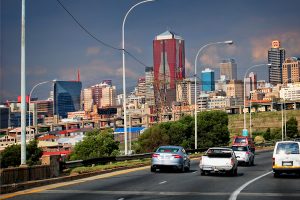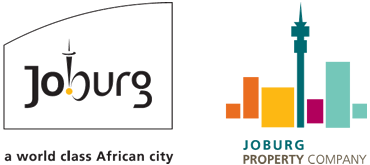 The City of Johannesburg has developed a growth and development strategy to take us into 2040. It is a strategy that not only provides a vision of the future, but importantly, defines clear outcomes against which to measure progress.
The City of Johannesburg has developed a growth and development strategy to take us into 2040. It is a strategy that not only provides a vision of the future, but importantly, defines clear outcomes against which to measure progress.
This strategy is central to the work of JPC: creating economic opportunities – but always with a social transformation agenda.
Emphasis is placed on harnessing property portfolio transactions to increase economic growth and implement Broad-Based Black Economic Empowerment, creating jobs and economic opportunities for disadvantaged communities and businesses.
Executive Mayor’s Foreword
Johannesburg has always been and continues to remain a city of stark contrasts – between those who enjoy the highest standard of living, and those who struggle to make ends meet. It is a city of colliding worlds and visions; a city divided and a city that still bears the spatial scars of the unjust and immoral system of Apartheid. However, this cannot be Johannesburg’s only story and it cannot be the story that prevails into the future. Johannesburg needs to change course. Joburg 2040 provides the basis for this change – as we continually strive to become an equitable, non-racial, prosperous, non-sexist and just society. Shifting course will require commitment and dedication from all who make this city their home. Extraordinary effort is demanded of all of us, to work towards building a more equitable society, where everyone is cared for and where none are neglected.
I announced the GDS outreach process precisely because I was aware of the large social, economic and environmental challenges facing this city. I was also aware of the parallel truth: that Johannesburg is a city of immense potential. This city’s greatest assets are its people. Through the outreach process, the contributions of thousands of citizens have been heard – with the final Joburg 2040 GDS providing clear evidence of the immense power of collective voices, and the enduring commitment of all those who have contributed.
Introduction and Overview
The Joburg 2040 GDS is an aspirational strategy that defines the type of society the city aspires to achieve, by 2040.
The City of Johannesburg developed its first Growth and Development Strategy (GDS) in 2006, as a long-term strategy – an articulation of Johannesburg’s future development path. At the time, there were numerous strategies, including, amongst others: ‘Joburg 2030’, the Human Development Strategy (HDS), the Integrated Transport Plan and the City Safety Strategy. Each addressed a different angle of the city’s development. The GDS provided the opportunity to consolidate all of these into a single cross-City strategy. It also served as the conceptual foundation for the five-year Integrated Development Plan (IDP).
The GDS Paradigm, Principles and Vision
Johannesburg – a World Class African City of the Future – a vibrant, equitable African city, strengthened through its diversity; a city that provides real quality of life; a city that provides sustainability for all its citizens; a resilient and adaptive society.
The Joburg 2040 GDS paradigm guides the City’s thinking in respect of the long-term outcomes and aligned outputs.
The initial GDS drafted in 2006 gathered input from a range of strategies and perspectives. Documents taken into consideration included, amongst others: the National Spatial Development Perspective (NSDP), National Government’s Medium-Term Strategic Framework (MTSF), the Accelerated and Shared Growth Initiative of South Africa (ASGISA) and the Gauteng Provincial Government’s Growth and Development Strategy. This practice continues here, in respect of new strategies. However, each important strategy and policy document is not discussed individually, but has been considered in the context of major events, policies and theories shaping the Joburg 2040 GDS paradigm.
Confronting our Reality: Challenges & Opportunities
This overview provides a mirror, reflecting the challenges that countries and cities worldwide face today.
The 2006 GDS included an analysis of the city’s status quo, which was used to formulate the GDS’ long-term goals and strategic interventions. This analysis was presented within the context of the following themes: economic development; human and community development (including a focus on housing and infrastructure); environmental sustainability; spatial development; transportation; health; safety; financial sustainability; governance and administration. This chapter serves to build on the analysis undertaken in support of the 2006 GDS, presenting an updated perspective of challenges and opportunities faced by the City.
Towards Implementation
A conscious decision was taken to position the GDS alongside the five-year IDP, which unpacks and defines the short and medium-term operational activities.
The Joburg 2040 GDS consolidates and refines the 2006 GDS, based on learning, experience, new theory and practice and importantly, the numerous debates with and inputs made by the City’s stakeholders. Emerging from the various inputs is a clear view of the future Johannesburg of which all stakeholders would want to be part. This chapter aims to present this future, and the long-term development path the City hopes to follow in order to reach it – articulated in the form of clearly defined outcome statements, outputs and proposed indicators. These outcomes define the type of society – and city – those within this metropolis, and those who work within the municipality itself, hope to see by 2040.
Listening to Our Citizens’ Voices – the GDS Outreach Process
The GDS outreach process was rolled out as conceptualised, with implementation including an array of platforms through which the City solicited input, ideas and suggestions
Johannesburg is constituted of unique people and organisations. The manner in which the metropolitan government addresses its mandate and functions is driven through the identification of its stakeholders’ needs, and the subsequent implementation and execution of strategies designed to continuously improve the quality of life of all. To assist the city in understanding these needs to a greater degree, the City implemented a feedback and engagement process, called the ‘GDS outreach’.
Concluding Thoughts
Johannesburg is one of the most cosmopolitan cities of the world.
It is a city that is life supporting:
- A place of hope and potential for many;
- A city with an economy that is the motor for national growth;
- A city that is home to the roughly four million people who live within it;
- A city that reflects the richness of our human heritage in its large concentration of hominid fossils;
- A city that is made up of an ever-increasingly diverse population – originating from many places, both within South Africa and beyond its borders.
